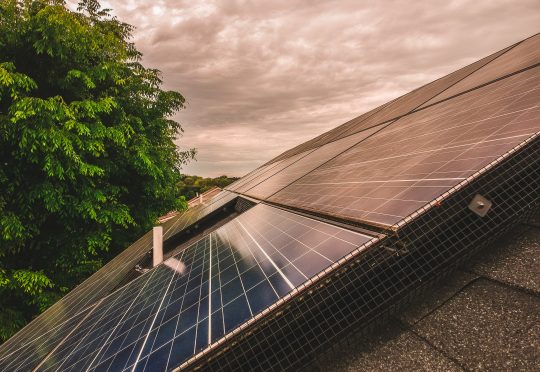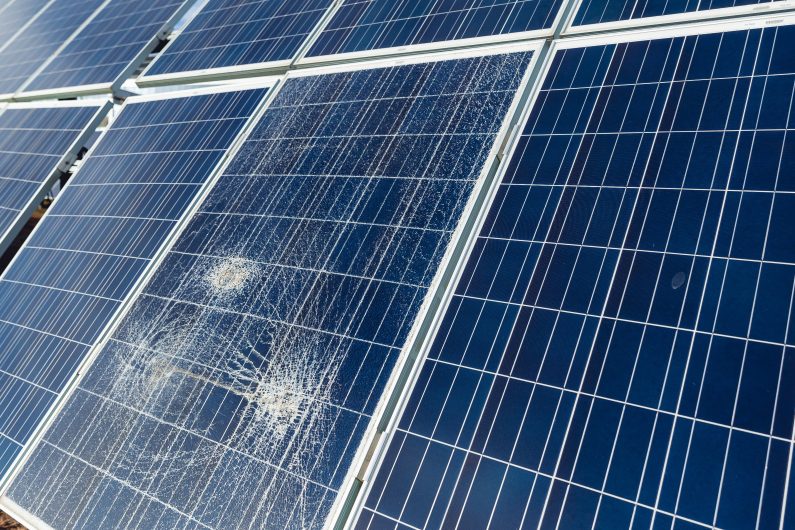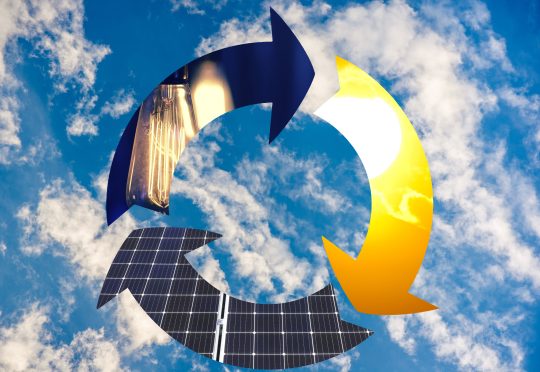
While solar panels are built to last 25-30 years, they’re not invincible. Damages to your system can be physical or seen in the energy output. Regardless of how far technology has advanced in the realm of solar systems, they are still subject to multiple forms of damage. We’re taking a closer look at the main causes of solar panel damage and more importantly, what you can do to protect your system from them.
1. Hail
Severe weather can cause devastating damage to solar panels, with hail storms considered to be one of the more common causes for solar panel damage. While tornados, blizzards, and thunderstorms are nasty threats – hail storms have been known to crack protective covering or even produce minor scratches that harm the effectiveness of your panels.
While there aren’t a lot of steps you can take to prevent this kind of damage, the good news is many insurance policies cover such damage – so it’s recommended to keep your plans up-to-date.
Another approach that some homeowners take is to install numerous smaller solar panels. This is an effective way to protect your energy output in the event of severe damage from a hail storm. Instead of relying on one large panel, having multiple small panels ensures that only a portion of your power will be lost if they are damaged, rather than all of them.
2. Debris
Even the smallest amounts of debris can cause damage. When leaves, small branches, and dust stick to the surface of your panels, it can cause scratches and marks across the surface of your system. These aren’t just physical damages, but also affect your panels in terms of output by lessening overall efficiency.
Fallen debris like twigs, acorns or branches can quickly diminish the energy output of your panel. These heavy items have enough force to break them completely, while less destructive scratches will still block out some direct sunlight and hamper the panel’s capacity for capturing energy.
The best way to ensure your panels don’t get damaged by debris is to make sure there are no trees directly over your home in such a close proximity to your panels. However, in some cases this may not be realistic – the next best thing is to periodically clean your panels, or hire a professional for regular inspections and cleaning.
3. Water damage
Lost or worn-out seals can lead to catastrophic consequences for solar panel owners – think of it like your everyday window sealant slowly becoming less effective, letting in unwelcome streams of water. Unchecked leaks can rapidly lead to short-circuiting or component breakage. Regular maintenance and inspections of your panels is key to making sure a problem such as this one doesn’t go unnoticed.
4. Animal interference
While they are harmless from a distance, backyard wildlife can inflict severe damage to your solar panel system. For example, squirrels have been known to create nests beneath panels and chew through wires – potentially leaving homeowners with the burden of costly repairs.
5. Foundational issues
If your solar panels are not performing as they should, it could be due to an unexpected source. Technical issues such as poor connection or battery terminal malfunction can be underlying causes for a drop in efficiency for your panels. Once these issues arise, they can easily and quickly be resolved with the help of an expert electrician who can troubleshoot to repair the problem and get your panels back in action
6. Excessive heat
It is a common misconception that extreme heat helps generate more electricity. Extreme heat can actually reduce the efficiency of panels up to 25%. Before investing in solar panels, it’s important to understand the region you’re in and the weather conditions tied to it. Chances are if you are living in an area where extreme heat is common, your system will degrade even further.
One way to combat excessive heat is to use monocrystalline panels instead of polycrystalline, since they are typically more efficient in warm weather. Consider equipping your system with ventilation systems, such as fans, to maximize efficient heat regulation.
7. Lightning
Lightning strikes can be separated into two different buckets – direct and indirect. In comparison to direct lightning strikes, indirect ones are far more common and can do greater damage. The high voltage induced by an indirect strike can ruin wiring systems as well as panels.
Direct lightning strikes are rare, but can deliver a devastating outcome to your solar panel system. A single direct strike has the potential of melting integral parts, or push current levels overboard which risks overheating your system.
8. Degrading over time
Last but not least, solar panels are bound to degrade over time due to exposure to the elements. Solar panels are built to last 25-30 years, so are built with durable materials to last. However, to keep your panels as efficient as possible it’s best practice to clean them routinely and hire a professional for an annual inspection as well.
Can a panel be repaired if damaged?
If your solar panel is damaged, it may still work, but it won’t function properly or at full capacity. The common red flag when it comes to noticing damage is your system not running at usual performance and output levels. Solar panels typically experience about 1% to 2% reduction in efficiency every year. So, it’s perfectly normal to see slight degradation in the efficiency of your system. However, if you experience a major decrease in efficiency, there might be more going on.
If the damage is severe enough, the entire panel will need to be replaced. In order to assess the damage, it’s best to hire a professional. Reach out to your solar provider for next steps, and also be sure to check in and see if any warranties could cover potential damage to your system.
Final Thoughts
Investing in solar panels ensures decades of clean energy. With proper maintenance, regular cleaning and favorable weather conditions, they can last up to 30 years. Many suppliers even offer a 20 year warranty on their products. By understanding the potential causes of damage, you can equip yourself with the tools to maintain your solar panel system and ensure long-term efficiency.
FAQ
What causes solar panels to degrade?
Natural degradation is caused by unavoidable elements such as humidity, UV exposure, and adverse weather conditions.
Are solar panels high maintenance?
In general, the level of maintenance required for solar panels is very manageable. The main maintenance recommended is to monitor performance, routine cleaning, and inspections from time to time.


